| Srl | Item |
| 1 |
ID:
120285
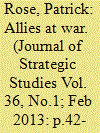

|
|
|
|
|
| Publication |
2013.
|
| Summary/Abstract |
This article compares the philosophy and practice of command in the British and US Armies during the Italian Campaign of 1943-44. It assesses pre-war influences on the command approach adopted by each army, and shows how refinements derived from wartime experience enabled British and American commanders to successfully utilise mission command principles to outfight the German Army in the latter years of World War II. This examination directly challenges the historical consensus that Allied commanders were disadvantaged by an inability to exploit the advantages of mission command, and that the German Army retained superior command practices, despite its other failings, throughout the fighting between 1939 and 1945. These conclusions hold additional relevance to modern military organisations which have emphasised mission command as the optimal solution to effective command in battle since the 1980s, but from an inaccurate understanding of German, British and American command traditions and experience that persists to this day.
|
|
|
|
|
|
|
|
|
|
|
|
|
|
|
|
| 2 |
ID:
128577


|
|
|
|
|
| Publication |
2013.
|
| Summary/Abstract |
This article sets out some personal views on leadership and junior officer development from the viewpoint of a warfare branch Lieutenant. The author is currently serving as the RN exchange officer at the Royal Military Academy, Snadhurst and considers an understanding of capabilities across the services vital in the joint efforts required by current conflicts
|
|
|
|
|
|
|
|
|
|
|
|
|
|
|
|
| 3 |
ID:
128672
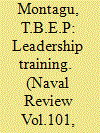

|
|
|
|
|
| Publication |
2013.
|
| Summary/Abstract |
An article written by the RN's exchange officer at the Royal Military Academy Sandhurst who deployed to Kabul as part of a mentor team for the Afghan National Army Officer Academy (ANAOA). The project is set to be the UK's enduring commitments to Afghanistan after the 2014 drawdown. The author highlights the challenges of the project from the political level through on the ground mentoring.
Leadership training
|
|
|
|
|
|
|
|
|
|
|
|
|
|
|
|
| 4 |
ID:
099703
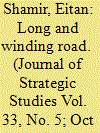

|
|
|
|
|
| Publication |
2010.
|
| Summary/Abstract |
The purpose of the current paper is to examine the adoption and adaptation process of mission command (Auftragstaktik) in the US Army. This concept, developed by the Prussians, denotes a decentralized command approach wherein superiors dictate their intent and allow subordinates to formulate their operational plans independently and change it according to the emerging situation. The paper examines the US command approach prior to the adoption of mission command. It argues that it was heavily influenced by corporate management practices which inherently contradict mission command approach. It continues and investigates how the US Army endeavored to emulate the approach in its doctrine and in major operations.
|
|
|
|
|
|
|
|
|
|
|
|
|
|
|
|
| 5 |
ID:
105381
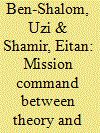

|
|
|
| 6 |
ID:
159132
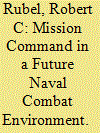

|
|
|
|
|
| Summary/Abstract |
Naval officers must understand the considerations required to exert effective mission command as
operations devolve into forms characterized by lesser degrees of structure and control.
|
|
|
|
|
|
|
|
|
|
|
|
|
|
|
|
| 7 |
ID:
189566
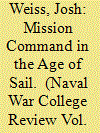

|
|
|
|
|
| Summary/Abstract |
This article develops an analytical framework for mission command; proposes the full age of sail as an area for current military officers to mine for relevant lessons; and examines, through the mission-command lens, a case study from that era, involving a dispute between the British naval and land-force commanders in the Caribbean during the Hundred Days of Napoléon Bonaparte.
|
|
|
|
|
|
|
|
|
|
|
|
|
|
|
|
| 8 |
ID:
138742
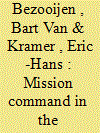

|
|
|
|
|
| Summary/Abstract |
Theory on the use of information technology in military operations assumes that bringing together units in an information network helps units to work together. Decentralized command systems such as mission command have been proposed for these networks, so that units can adapt to changes in their turbulent working environments. Others have proposed centralized command systems that permit higher organizational levels to closely direct military operations. This article uses Perrow’s (1984, 1999) Normal Accidents Theory to propose that increasing interdependencies between units in information networks places incompatible demands on the design of networked military operations. It is concluded that networked military operations require decentralized command approaches, but only under the condition that interdependencies between modules of networked units are weak rather than tight. This precondition is essential for retaining control over networked military operations.
|
|
|
|
|
|
|
|
|
|
|
|
|
|
|
|
| 9 |
ID:
156266
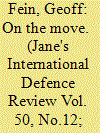

|
|
|
| 10 |
ID:
128691
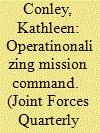

|
|
|
| 11 |
ID:
175453
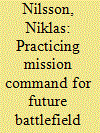

|
|
|
|
|
| Summary/Abstract |
As armies across Europe are currently developing capabilities to fight a high-intensity conventional war against a peer adversary, these armies will have to develop units that can fight independently in a complex environment, with limited direction from higher levels of command. Integral to this process is the need for a competent practice of mission command, viewed as a key component of maneuver warfare. The article identifies a set of enablers that need to be present in a military organization in order to practice mission command efficiently, including shared understanding and trust; initiative; a tolerant approach to failure, success, and learning; and the acceptance of mission command as an all-encompassing practice. The article then presents data from interviews with Swedish army officers focusing on the presence and significance of these enablers in their professional context. The article concludes that the increasing complexity of the peacetime tasks performed by military officers give rise to conflicting leadership demands. Consequently, exercising mission command and socializing younger colleagues into the practice is a far from straightforward process, which frequently competes with other demands placed on officers by their colleagues, the organization that they are part of, or the broader societal context.
|
|
|
|
|
|
|
|
|
|
|
|
|
|
|
|
| 12 |
ID:
151810
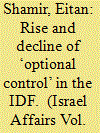

|
|
|
|
|
| Summary/Abstract |
Mission command is a command philosophy that denotes decentralized leadership; it is a philosophy of command that requires and facilitates initiative in all levels of command and encourages subordinates to exploit opportunities by empowering them to demonstrate initiative and exercise personal judgement. In its first decades of existence, military analysts portrayed the Israeli command system as such and termed it ‘optional control’. The primary objective of this article is to explore the rise and decline of ‘optional control’ in the IDF. The first part of the article follows the development of optional control in the IDF’s first decades of existence until the 1970s. The second part of the paper will describe its decline through the analysis of command in recent IDF military campaigns. The last part is analysis; explanation for the decline in mission command is attributed to four major factors: the changes in Israel’s society and thereof in civil‒military relations; the changes in character of military operations; the lack of appropriate military education; and the role and impact of new technologies on the IDF. The combined effect of these factors impedes the ongoing efforts of the IDF to re-establish mission command as its preferred command philosophy.
|
|
|
|
|
|
|
|
|
|
|
|
|
|
|
|